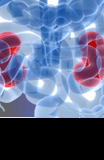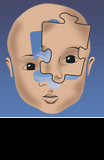Endocrinology
Endocrine glands produce and secrete hormones into the blood or lymph systems.
These glands include:
- thyroid
- parathyroid
- hypothalamus
- pituitary
- adrenal
- islets of Langerhans in the pancreas
- gonads (testes and ovaries).
These hormones may affect one organ or tissue or the entire body. There are many disorders that can result when too few hormones are secreted (hyposecretion) or too many are secreted (hypersecretion).
Disorders that may result when a particular gland does not produce the right amount of hormones include the following.
- Thyroid: hypothyroidism, myxoedema, goitre, thyrotoxicosis
- Parathyroid: high calcium, tetany, renal calculi, excessive loss of minerals from bone, hypercalcaemia
- Adrenal: Addison's disease, phaeochromocytoma
- Pituitary: non-functioning tumour, diabetes insipidus, acromegaly, gigantism, Cushing's syndrome, dwarfism
- Testes and ovaries: lack of sex development, hypogonadism
- Pancreas: diabetes, hypoglycaemia
These conditions may be treated by medicine or surgery. Oxford University Hospitals has internationally recognised experts in the treatment of these disorders.
For more information please visit:
What is endocrinology? - Society for Endocrinology
OCDEM
OCDEM is a unique clinical, academic and research partnership that is home to the OUH Endocrinology Department and is a renowned tertiary referral service.
OCDEM's busy medical department provides a wide range of endocrine clinics.
Clinics
- Thyroid
- Radioiodine for Benign Thyroid Disease
- Thyroid Cancer clinics (joint with Oncology)
- Thyroid Eye Disease MDT clinics (joint with Ophthalmology and Rheumatology)
- Joint Pituitary Clinics (joint with Neurosurgery)
- Endocrine Oncology and Neuroendocrine Tumour (NET) Service (OCDEM is a ENETs Centre of Excellence)
- Reproductive Clinic
- Transition Endocrinology (joint with Paediatrics)
- Late Effects Clinic (joint with Oncology)
- Turners Clinic
- Congenital Adrenal Hyperplasia (CAH) Clinic
- Endocrine Effects of Immunotherapies (joint with Oncology)
- General Endocrinology Clinic (where we will see a range of common acute and chronic endocrinology conditions)
For more information please visit:
Appointments
We run a range of appointment types, in person and telephone consultations.
Please only come to the department if you are scheduled to have an in person consultation.
If you have any concerns or would like to speak to a member of the team about your appointment, please contact us.
Tel: 01865 857300
For urgent endocrinology advice out of hours, please contact the on-call Endocrinology team via OUH Switchboard.
Tel: 0300 304 7777
Getting your bloods done
Currently blood-taking services within OCDEM are limited. When available, they are often reserved for special tests that cannot be facilitated elsewhere.
This means we may ask you to get your bloods done at one of our Phlebotomy hubs.
On the Churchill Hospital site there is a drop-in Phlebotomy service which patients can access:
Detail from Churchill Hospital site map
Consultants
- Dr Bahram Jafar-Mohammadi
- Dr Christine May
- Professor Katherine Owen
- Dr Aparna Pal
- Professor David Ray
- Professor Jeremy Tomlinson
- Dr Helen Turner
Information leaflets
Patient information leaflets library
Support groups
The Society for Endocrinology is affiliated with a wide variety of groups offering information and support.
- Addison's Disease Self-Help Group (ADSHG)
- Adrenocortical (ACC) Cancer Support UK
- Alex, The Leukodystrophy Society
- British Thyroid Foundation
- Brittle Bone Society
- CAH Support Group
- Child Growth Foundation
- Disorder of Sex Development (DSD) Families
- Haemochromatosis UK
- Klinefelter's Syndrome Association UK
- Neuroendocrine Cancer UK
- Parathyroid UK
- Prader-Willi Syndrome (PWS) Association UK - PWSA UK
- The Pituitary Foundation
- Turner Syndrome Support Society
Find us and contact us
OCDEM is based at the Churchill Hospital.
Tel: 01865 857371 (Reception)
How to find the Churchill Hospital
Get involved
Please join our Patient Partners Group to help explore ideas to develop our service:
Map
Detail from Churchill Hospital site map highlighting OCDEM, Car Park 4 and Pharmacy (pdf, 213 KB)




























































